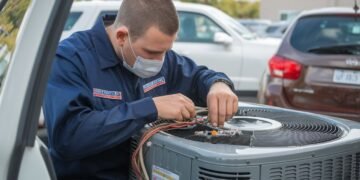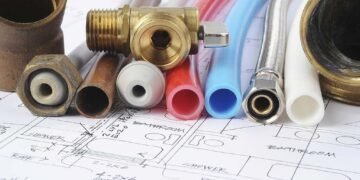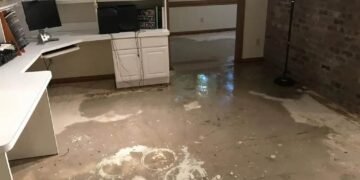If you’re a first-time homeowner, understanding the fundamental aspects of home electrical systems can be invaluable in repairing faulty wiring to taking care of energy sources.
Every home needs electrical wiring. Before taking on any electrical project, it’s important to understand the basics upfront.
This guide will have you up to speed on all things related to home electrical basics and safety measures. Scroll down to learn more.
1. Understand the Power Source in Your Home
Before you work on any electrical system, you should understand the power sources for your home. Most households get their energy from the local electricity grid through an electrical panel board and circuit breakers.
Understanding how these components work is essential to troubleshooting problems that may arise. Moreover, be aware of alternate energy sources in your home, such as wind turbines or solar panels.
If you are curious and want to learn more, here is a comparison of Circuit Breakers Vs Fuse Box. It will give you a good insight into how these two differ.
2. Learn Standard Types of Home Wiring Systems
Knowing the standard types of home wiring and their components is essential for electrical work. Common residential wiring systems include knob-and-tube wiring, armored cable, nonmetallic sheathed cable, flexible conduit, and service entrance cables.
Learning to identify these different types of wires and their proper installation techniques can help you identify any problems when troubleshooting electric circuits.
Also Check: How To Do Home Theatre Wiring Easily Without Any Knowledge
3. Protect Your Home from Electrical Hazards
Electrical safety is a top priority for any homeowners and renters. Making sure your home is electrically safe is essential for maintaining its value and preserving your family’s safety.
To protect your home from potential electrical risks, install fault circuit interrupters and surge protectors in vulnerable places like kitchens and bathrooms and cover unused switch boxes with a cover plate. This will give you extra protection when there are voltage fluctuations and helps protect your electronics from power outages.
Many home electrical systems experience problems due to surges, spikes, overloading, or unintended ground potential. Regularly checking all existing wiring and replacing them if they’re damaging can help maintain the safety of everyone living in your home.
One of the best way to protect your devices from electric damage is to use Best Home Theatre Power Manager.
4. Stay Protected With Ground Fault Circuit Interrupters (GFCIs)
Ground Fault Circuit Interrupters (GFCIs) are special outlets designed to shut off power in case of an electrical overload quickly. These special GFCI receptacles must be installed in all bathrooms, kitchens, laundry rooms, and outdoors.
A GFCI will detect any leakage currents that may result from an electric shock, thus serving as a safety measure for your home’s electrical systems. When making repairs around the house, especially with any wiring that requires cutting into walls or other electrical work, make sure you install GFCI receptacles for added protection.
5. Find and Identify Electrical Circuits in Your Home
Homeowners should become familiar with the circuit layout of their homes. Electrical circuits have paths, beginning at the main electric service panel and extending through the house via individual designated circuits.
Knowing which outlets are part of a particular circuit can help you better manage electricity usage and identify potential wiring issues. If major changes such as rebuilding a room have been done to your home, it’s also important for homeowners to ensure that the electrical lines are still safe, not damaged or hidden behind walls, before switching them back on. If you do have used or surplus equipment to sell, then you need to contact them to sell electrical equipment to make the process as smooth and profitable as possible.
6. Understand How Electrical Service Connection and Meter Works
Electric service connections and meters dictate the flow of electricity from utility companies to homes. The electric meter is located on the outside of your home and it records the amount of electricity that you use.
The electrical service connection supplies power to your home, and it needs to be in good condition for your electrical system to run safely. It’s important to understand how these pieces function so you can ensure they are working correctly!
7. Safety First When Doing Electrical Work
It is always important to prioritize safety when working with electricity. Unguarded electrical equipment may become energized suddenly and expose exposed energized parts to electrical safety risks.
Whenever you work on a receptacle at home, make sure the main switch is off whenever you work on a home receptacle. Additionally, use insulated tools, wear insulated rubber gloves and goggles, and never try repairing energized equipment. Use a wood or fiberglass ladder rather than a metal one if you need to use a ladder.
8. Know How Many Outlets Are Safe to Plug Into an Outlet
You should only plug up to two products into an outlet at a time. Adding too many items onto an outlet could cause them to heat up and put your household at risk of an electrical fire.
Similarly, using an adapter or “octopus” to expand the number of plugs on one outlet increases the chances of a potential fire. To avoid these risks, use surge protectors to extend the number of outlets while providing added protection against power surges and outages.
9. Learn What Type of Electrical Box You Need For Your Project
The type of electrical box you need for your project depends on the size and complexity of the wiring and where the wiring will be connected. Electrical boxes may come in metal or plastic, typically junction boxes for connecting two sets of wiring (such as a switch to a light fixture) or outlet boxes that provide plugs for connecting appliances. Make sure to use the appropriate box for your wiring, according to its size and complexity.
10. Get the Right Wire Gauge for Longer Runs
The wire gauge you use when wiring your home will depend on the length of your runs. Longer runs – such as a switch to a faraway light fixture – require thicker wire with a greater electrical current.
Shorter runs, like those between two outlets, can use thinner gauges of wire. Ensure the appropriate type and size of wire for each project to ensure safety and functionality!
Conclusion
Avoiding water when working with electricity and using equipment with undamaged cords and plugs are among the basics of using home electricals.
It is a wise idea to use insulated tools and rubber gloves. In addition, make sure the GFCIs are checked regularly. Staying safe when dealing with electricity is easy when you follow these safety tips. Check out our other article for more tips on unique hacks for everyday home repairs.















